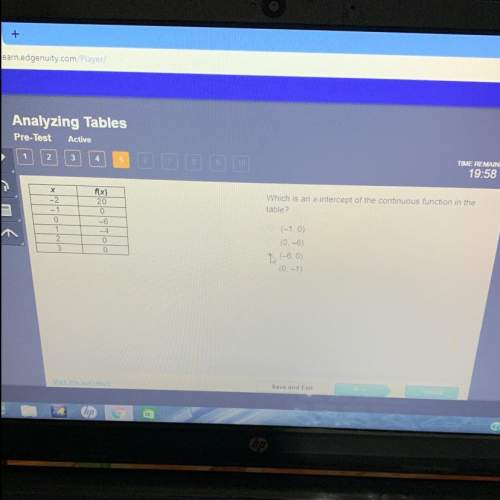
Mathematics, 21.08.2020 03:01 spiritcampbell56
Let the function f be continuous and differentiable for all x. Suppose you are given that f(−1)=−3, and that f'(x) for all values of x. Use the Mean Value Theorem to determine the largest possible value of f(5).


Answers: 3


Another question on Mathematics

Mathematics, 21.06.2019 15:30
For what is the measure of the angle at the top of the shed? a. multiplication of areas b. squaring of areas c. addition of areas d. division of areas
Answers: 1

Mathematics, 21.06.2019 16:00
An appliance store sells a washer-dryer combination for $1800. if the washer costs $300 more than the dryer, find the cost for each appliance.
Answers: 3

Mathematics, 22.06.2019 00:30
Long division setup showing an incomplete calculation. 12 is in the divisor, 6839 is in the dividend, and 5 hundreds and 6 tens is written in the quotient. 6000 is subtracted from 6839 to give 839. an unknown value represented by a box is being subtracted from 839. what number should be placed in the box to complete the division calculation?
Answers: 3

Mathematics, 22.06.2019 03:00
In this problem, we explore the effect on the standard deviation of multiplying each data value in a data set by the same constant. consider the data set 14, 6, 8, 15, 15. (a) use the defining formula, the computation formula, or a calculator to compute s. (round your answer to one decimal place.) s = 4.28 (b) multiply each data value by 3 to obtain the new data set 42, 18, 24, 45, 45. compute s. (round your answer to one decimal place.) s = 12.83 (c) compare the results of parts (a) and (b). in general, how does the standard deviation change if each data value is multiplied by a constant c? multiplying each data value by the same constant c results in the standard deviation remaining the same. multiplying each data value by the same constant c results in the standard deviation being |c| times as large. multiplying each data value by the same constant c results in the standard deviation increasing by c units. multiplying each data value by the same constant c results in the standard deviation being |c| times smaller. (d) you recorded the weekly distances you bicycled in miles and computed the standard deviation to be s = 3.8 miles. your friend wants to know the standard deviation in kilometers. do you need to redo all the calculations? yes no given 1 mile ≠1.6 kilometers, what is the standard deviation in kilometers? (enter your answer to two decimal places.)
Answers: 1
You know the right answer?
Let the function f be continuous and differentiable for all x. Suppose you are given that f(−1)=−3,...
Questions



Computers and Technology, 19.03.2021 22:00

Mathematics, 19.03.2021 22:00

Mathematics, 19.03.2021 22:00

History, 19.03.2021 22:00

Mathematics, 19.03.2021 22:00


English, 19.03.2021 22:00

Health, 19.03.2021 22:00


Mathematics, 19.03.2021 22:00

Mathematics, 19.03.2021 22:00


Biology, 19.03.2021 22:00



Mathematics, 19.03.2021 22:00


Mathematics, 19.03.2021 22:00








